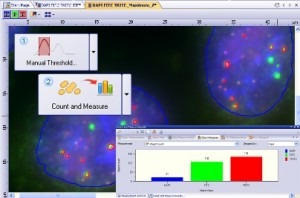
Olympus has released its Count and Measure Solution module for the Cellsens Dimension software suite, with which image information can be exported to Microsoft Excel for efficient analysis of results.
The module makes it simple to design and automate image analysis protocols by providing advanced object detection and structure differentiation.
This maximises accuracy and reproducibility while minimising the time users must devote to manual image processing.
The system can be easily configured to recognise objects and structures based on user specifications by employing a range of threshold-based methods, thereby defining rules with which to process a batch of images.
The system is also suitable for performing complex analyses such as those requiring multiple measurements per image.
The new Cellsens Count and Measure Solution module integrates seamlessly with the Cellsens Dimension platform to supply flexible, automated image analysis.
The system provides advanced thresholding and spectral unmixing capabilities to facilitate the easy definition of objects of interest, including automatic, manual, manual Hue Saturation Value (HSV) and adaptive methods.
This standardises measurement parameters thereby reducing error and variability, while simplifying and speeding up data capture.
In all cases, the information acquired can be exported to Microsoft Excel as diagrams, graphs or raw data, making the analysis of results straightforward.
Measurement parameters available include area, aspect ratio, bisector, bounding box, gravity centre, ID, mass centre, intensity values, convexity, diameter, elongation, ferret, extent, next-neighbour distance, orientation, perimeter, radius, shape and sphericity.
Each of these can be combined and used in conjunction with automatic object detection to perform complex data analysis.
This makes it possible to generate comprehensive data sets with minimal user input, all within the same processing run.
The Cellsens Dimension software package provides a range of features designed to offer control and processing for microscope-based experimental systems.
The addition of optional Solution modules, including Cellsens Database, Netcam, Count and Measure, Multiposition, Deconvolution and Multichannel 5D, further extends the flexibility and customisability of the platform.
Users can conduct a range of complex and highly sophisticated experiments, from extended focal imaging to multiple-image alignment and multi-position imaging.
With the ability to control a wide range of Olympus and non-Olympus hardware, advanced and precise time-lapse experiments can be conducted.
The resulting time stacks can then be put through kinetic and threshold-based object analysis.
The data produced is easy to export and analyse, while the unique report composer uses Microsoft Word templates to generate user-defined reports based on information retrieved directly from the Cellsens database.
This facilitates interpretation and makes it easy to share and discuss data with colleagues.





